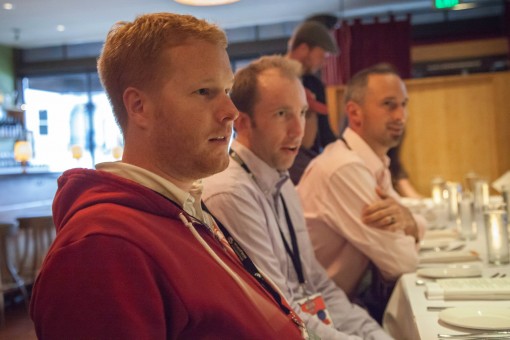My biggest take-aways from WordCamp San Francisco 2013 were:
- 2 water bottles
- 4 t-shirts
- 10 stickers
- 2 pair of sunglasses
…but seriously, the sessions I attended were great and I was able to see the direction that the WordPress project and community are headed. All while having some serious (and fun) discussions (with beverages).
Here are some of my highlights from a ‘project’ perspective (and perhaps less technical):
git is coming
The tool makes development easier for a number of developers and, if we’re already doing other work with git, why not WordPress development? Sure, Otto says there’s nothing that can’t be done in subversion, but I think this will also help lower a barrier to entry for new developers and contributors.
the project continues to grow up
The lego diagram that Matt showed during his keynote closely matches a metaphor I’ve been working on with the Crowd Favorite team on our WordPress page on our in-progress website redesign. Thinking about WordPress as a platform — which on top of that is a CMS, which on top of that is a blog — is an interesting way to think about the project’s direction and I hope it starts to drive more of the core design and development decisions (and not simply blog-centric decisions that would have us chasing after competitors like Medium and Squarespace).
More technically speaking, there were also some good conversations started around re-organizing the project code and even Open Sourcing more of the project website (http://wordpress.org/) and the tools themselves. It’ll be fun to keep these efforts moving, mature the operations, and make it easier for others to join and contribute to the project.
we should stop accepting bad practices
I think this point dovetails nicely from the previous two: do the right things, do the best things, and don’t get dragged down by the least common denominator. I think we’ll see this affect decision making for years to come and look back at 2013 as when a lot of this began.
Mark Jaquith’s talk also showed a lot of people the tip of the iceberg when it comes to solving known problems: botched deploys, late-night deploys, losing code changes, having proper testing environments, and so on.
project management is hard
The greatest engineers are not necessarily the greatest project managers. A lot of people have acted in various capacities as ‘leads’ and ‘representatives’ and so on but I think we’ll start to see more prioritization, active scheduling, management, accountability, process, and so on. There are pros and cons to having everyone and anyone “contribute” and there is room for improvement. It’ll be an experiment as we go into development of versions 3.7 and 3.8 to see how changes in process and management affect the overall project momentum, quality, and so on.
But most of all, it’s fun to come together and chat with friends (new and old) and talk about how things are going, where things are headed, where we’ve all been, and trade notes on personal and professional subjects alike. Here’s to another great WordCamp San Francisco.


